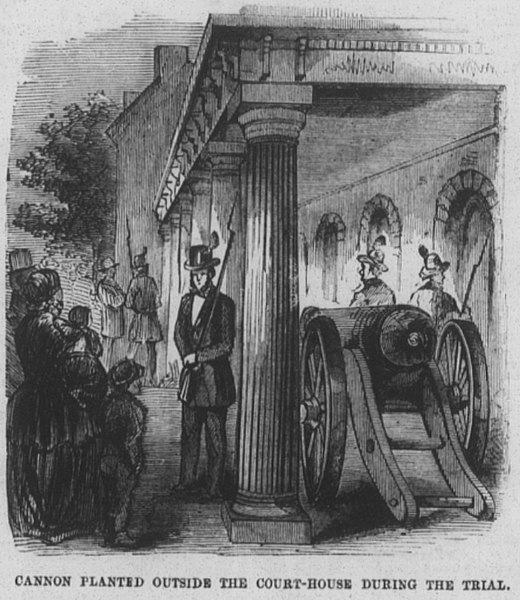Henry Alexander Wise was an American attorney, diplomat, politician and slave owner from Virginia. As the 33rd Governor of Virginia, Wise served as a significant figure on the path to the American Civil War, becoming heavily involved in the 1859 trial of abolitionist John Brown. After leaving office in 1860, Wise also led the move toward Virginia's secession from the Union in reaction to the election of Abraham Lincoln and the Battle of Fort Sumter.
Henry A. Wise
Henry A. Wise (1846)
Gen. Wise during the American Civil War.
Wise (top row, second from right) with Robert E. Lee and Confederate officers, c. 1869.
Virginia v. John Brown was a criminal trial held in Charles Town, Virginia, in October 1859. The abolitionist John Brown was quickly prosecuted for treason against the Commonwealth of Virginia, murder, and inciting a slave insurrection, all part of his raid on the United States federal arsenal at Harpers Ferry, Virginia. He was found guilty of all charges, sentenced to death, and was executed by hanging on December 2. He was the first person executed for treason in the United States.It was in many respects a most remarkable trial. Capital cases have been exceedingly few in the history of our country where trial and conviction have followed so quickly upon the commission of the offense. Within a fortnight from the time when Brown had struck what he believed to be a righteous blow against what he felt to be the greatest sin of the age he was a condemned felon, with only thirty days between his life and the hangman's noose.
John Brown
Cannon outside the Charles Town courthouse during John Brown's trial
Brown arises from his cot, holds a table for support, and addresses the public. Standing is prosecutor Andrew Hunter. "John Brown's Trial at Charlestown, Va.", by David C. Lithgow, 1923. Essex County Courthouse, Elizabethtown, New York.
Mary Brown escorted to visit her husband John Brown, the day before his execution. From Frank Leslie's Illustrated Weekly, December 17, 1859.








